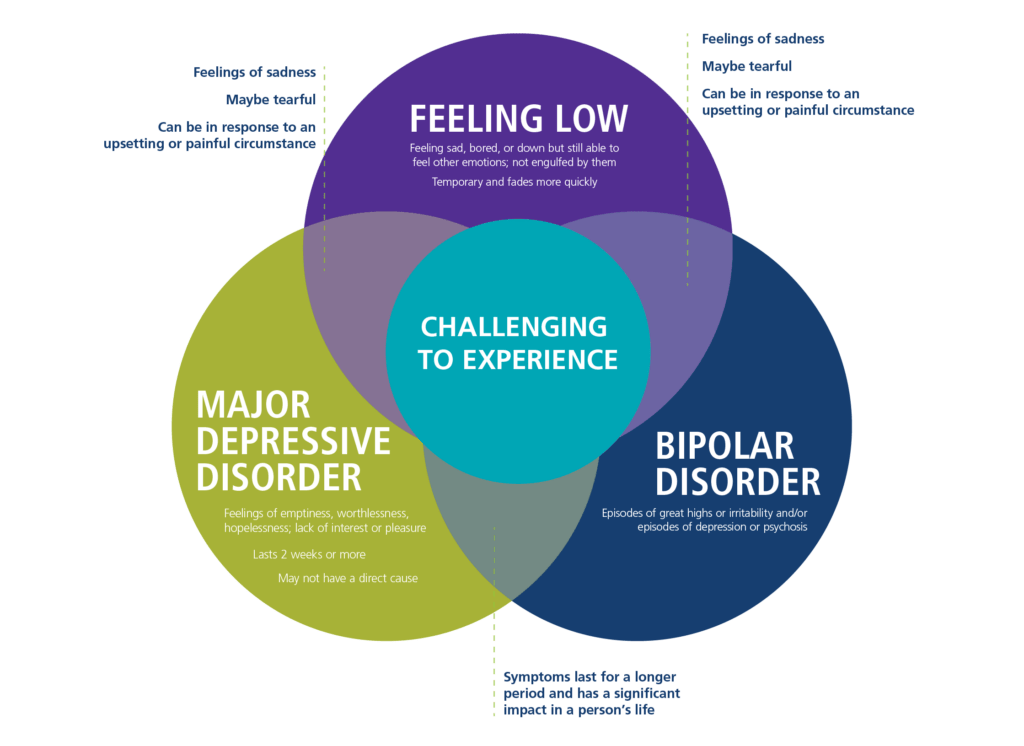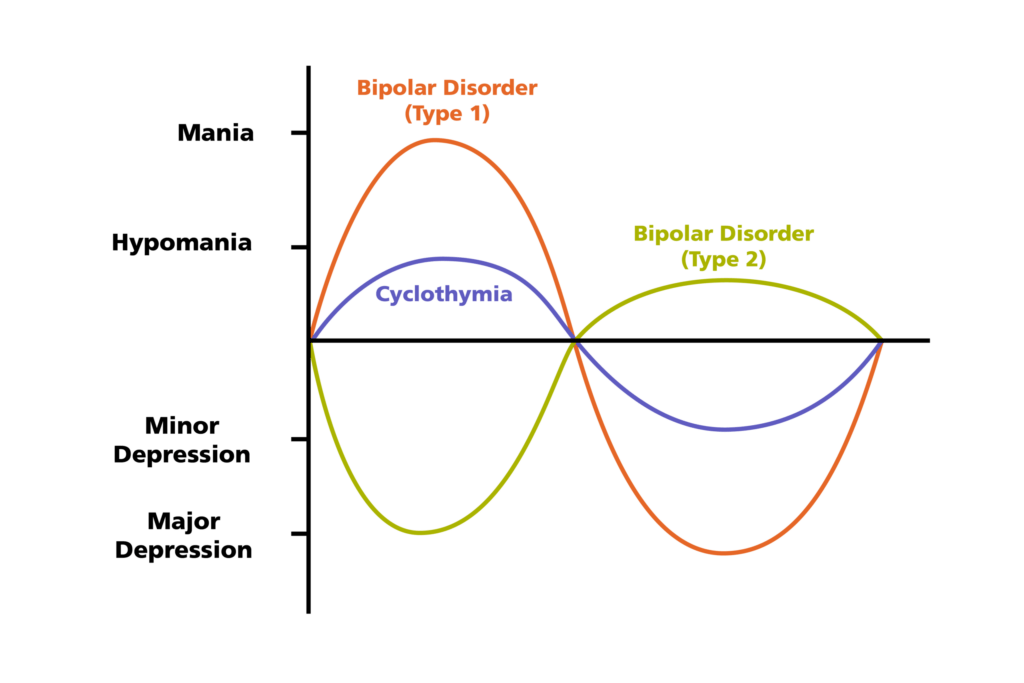Is it more than a bad day?
While depression, bipolar disorder, and feeling low are all undoubtedly challenging to experience, they are not the same. It’s normal to occasionally feel down or have a bad day. When a sad mood lasts for a long time or interferes with normal, everyday functioning, you may be experiencing a mood disorder.
What depression feels like

Stephanie C.
“A hole filled with bats and other stuff that you fall into.”

Greg C.
“A predator that stalks after you, always waiting for that right moment to strike.”

Tre M.
“A sinking boat with no one around. Absolutely no one.”

Sydney W.
“A rain cloud that follows you around.”

Michelle P.
“A roommate in the apartment of my mind. It’s sometimes alright as a roommate, and at other times it takes up so much space, it’s hard to do anything.”

Delia D.
“Like you are tethered to someone you dislike, 24/7.”

Cayla V.
“Like an old phone battery that doesn’t hold its charge like it used to.”

Elaina S.
“Like avoiding a salesperson at your door.”

Emma S.
“Trying to walk under water, like a weight of exhaustion has taken over your body.”

Sarah P.
”A dark, looming beast that engulfs you and snuffs out the light.”

Anushka G.
“Being locked in a dark closet all alone.”

Stephen C.
“Having a black screen on your computer when you try to play a video in full screen.”
Support is closer than you think.
If you’re facing a crisis, you deserve help. View our recommendations for crisis support services. There is no such thing as “not bad enough” to seek mental health services and support.

What are mood disorders?
Mood disorders, such as depression and bipolar disorder, affect people emotionally. If you have depression, you may constantly feel sad. You also may be anxious. If you have bipolar disorder, you’ll likely have extreme mood swings.
Your feelings may range from being very sad, empty, or cranky to being very happy — going back and forth between each mood. Having a mood disorder may raise your risk of suicide. This risk is higher if the mood disorder is serious and you also misuse alcohol or drugs.
Keep in mind…
There are other mood disorders we don’t highlight here. Please consult a mental health professional if you think you may have a mood disorder.
Mood disorders can be hard to identify
People living with depression or bipolar disorder may experience a range of symptoms over weeks, months, or even years. While there is some overlap in these disorders, it can be difficult to distinguish between them.
-
- Mood disorders will likely experience depression to some degree. People with bipolar disorder and people with major depressive disorder all experience depression. People with bipolar will also have manic or hypomanic episodes while people with just major depressive disorder won’t have the mania.
- Bipolar disorder varies from person to person.
People with bipolar disorder can be severely depressed for weeks, months, or even years before entering a manic (elevated and/or irritable) or hypomanic period. They may even experience multiple depressive episodes in a row before ever having a manic/hypomanic episode. - Mania can be hard to spot.
People may not recognize they are experiencing mania/hypomania, because it may appear and feel like productivity, happiness, increased energy, and feeling “good.” - Culture plays a key role in how individuals perceive and experience mental illness.
For more information about mental health across diverse communities, check out Each Mind Matters.
What You REALLY Need to Know About Depression
Depression looks different for everyone:
- Some with depression have trouble falling asleep while others sleep more than usual.
- Some may have no appetite while others may have an expanded appetite.
- Some could experience a break from reality (psychosis) that could include hallucinations or delusions.
As a friend:
- Instead of looking out for a small subset of symptoms, pay attention to changes in behavior.
- Avoid saying “depression” when you really mean “sadness.” Depression is more chronic, severe, and debilitating than feeling low.
Depression symptoms aren’t always situational or caused by a traumatic event. It may feel relatable or easier to understand when a friend is experiencing depressive symptoms after the loss of a loved one, the loss of a job, or other traumatic event. However, Major Depressive Disorder can also occur without a clear, situational cause. It’s important to check in on those in your life who may seem to “have it all together” or who you see as having “no reason to be depressed.”
If everything feels difficult right now, you are not alone.
What You REALLY Need to Know About Bipolar Disorder
There are actually different types of bipolar disorder and different ways it is diagnosed. Generally, people living with bipolar disorder experience both depressive episodes and manic or hypomanic episodes. You may think of mania or hypomania as just feeling abnormally upbeat or excited about life, but it can actually present in different ways, such as:
- Feeling jumpy or wired
- Increased activity, energy, or agitation
- Exaggerated sense of well-being and self-confidence (euphoria)
- Decreased need for sleep
- Unusual talkativeness
- Racing thoughts
- Distractibility
- Impulsive decisions or risky behavior
Mania can sometimes result in a break from reality (psychosis) that can include hallucinations or delusions. Hypomania is a milder form of mania and can include feeling more happy, irritable, talkative, and/or energetic than usual over just a few days.
You don’t have to be an expert to help.
Learn more about how to help someone experiencing severe mania or psychosis and other mental health issues.

There are different types of bipolar disorder that people can experience.
- Bipolar Disorder (Type 1)
Has experienced a manic episode resulting in disruptions in relationships, school, or work. Someone doesn’t need to experience a depressive episode to be diagnosed with Type 1, but the manic episode can be followed or preceded by hypomanic or depressive episodes. - Bipolar Disorder (Type 2)
Has experienced one or more depressive episodes and one or more hypomanic episodes, but no manic episodes. - Cyclothymia
Has experienced periods of depressive symptoms and hypomanic symptoms, but are not characteristic of full depressive or hypomanic episodes for at least two years.
Other important things to know:
- Although each type results in mood disruptions, the presentations often look very different from one another.
- People living with bipolar disorder can experience mixed episodes — simultaneous symptoms of depression and mania.
- Symptoms can present differently for people of different races, ethnicities, genders, and more. For example, some individuals with bipolar disorder who menstruate (though not all) may find their symptoms worsen at different points in their menstrual cycle.
Supporting Someone Living with Depression or Bipolar Disorder
As you care for a loved one who is struggling with their mental health, don’t forget to recognize your limits, set boundaries, and refer to professional help when needed. This process can be tough and sometimes heartbreaking for everyone involved. Create space to grieve the changes you’re seeing in your loved one, and know that it isn’t personal and that your own self-care is also important. It may not be emotionally easy, but it’s worth it.
Don’t gaslight a friend with depression or bipolar disorder
- Don’t try to “fix” the issue or rush to solutions.
- Seek to understand first, instead of judging.
- Hear them out before using your own experience to relate to them.
- Avoid saying it’s not that bad or “At least….”
- You don’t need to be an expert to A.S.K. — Acknowledge, Support, Keep-in-Touch.
“After years of therapy, … I began to tell myself that I was going to prove society wrong, I could have a mental illness and I could be successful.”
– Sarah Berendt
The language we use matters.
- The weather can’t be bipolar
The images we often associate with bipolar disorder are not accurate. Phrases like “the weather is so bipolar” perpetuate the myth that a person with bipolar disorder fluctuates between moods at the drop of a hat or displays exaggerated, intense, or uncontrollable emotions. - Don’t Tell Them to Try Harder
Once a person has become depressed, it’s not a matter of just “talking themselves out of” a low mood. Having someone tell you to try harder when you are already giving it your best effort can be demoralizing and may make a person with depression feel their situation is hopeless. - Avoid Platitudes
Statements like “This too shall pass,” “Let it go,” and “You’ll get over it” may be true, but a person who is depressed may not have the perspective necessary to entertain the idea — let alone believe it. A person who is depressed may have a hard time envisioning the future because they are overwhelmed by the present.
Tips for supporting someone through severe symptoms
Mania, unlike hypomania, causes severe impairment in a person’s functioning. It can even result in a break from reality (psychosis) that can manifest in hallucinations or delusions. Although everyone’s experience and recovery journey is different, here are three things you may expect when entering a conversation with a loved one in the midst of severe mania or psychosis:
This is true…
- It will likely be hard to see your loved one struggling in this way, especially when you may not understand their experience or reality.
- You likely won’t understand, and you may not know what to say next.
- You may feel defensive, frustrated, or argumentative, and quick to deny their reality.
And yet, this is also true.
- By staying calm, you can help reassure your loved one that you are here for them.
- That’s OK. By asking open-ended questions and listening in a nonjudgmental way, you can reinforce your love and commitment to them and their recovery.
- These are difficult feelings to process, and that’s OK. Focus on validating the underlying fears and emotions your loved one is feeling while striving to not make any judgments on a belief they’re expressing. Give yourself as much grace as possible, and if you feel defensive or argumentative, remind yourself that just because it isn’t your reality, that doesn’t mean it isn’t what they are feeling and believing.
Note: Signs of struggle vary. As friends, loved ones, and colleagues, our job is not to diagnose issues but to educate ourselves, pay attention to changes in behavior (i.e. changes in eating or sleeping patterns), and be there to support them along their journeys.
Coping Strategies for Difficult Times
Whether we are having a bad day, feeling stressed about work, struggling with anger, or feeling nothing at all, we don’t have to just live with it. There are tools available to help us uncover what’s going on beneath the surface and take action.
Discover Active Minds Programs
Send Silence Packing®
An immersive experience that illustrates the stories and centers the voices of youth as they guide us through their mental health journeys to end the silence surrounding mental health.
A.S.K. your friends
Active Minds and MTV’s A.S.K. Acknowledge, Support, Keep-in-Touch, the new “stop, drop, and roll” of emotional support.
Find a Chapter
Peer-led mental health advocacy groups, equipped to mobilize and change the conversation about mental health in their school and communities.
The content on this site is intended for educational purposes only and should not take the place of talking with your doctor or healthcare professional. It should not be used for diagnosing or treating a health problem or disease. If you have any questions about your medical condition, talk to your healthcare professional.


